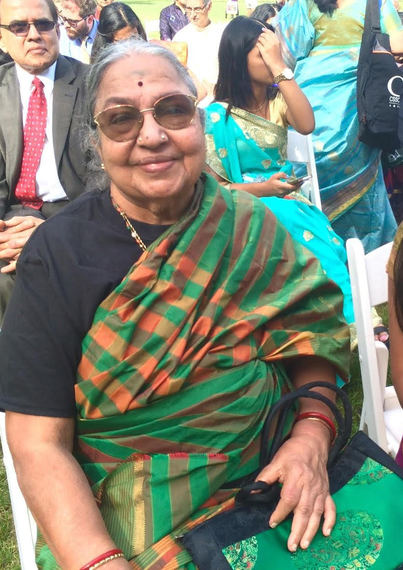When I was growing up, I learned virtually everything I knew, and much of what I know today, about Hinduism from my grandmothers and my great-grandmother.
My paternal grandmother and her mother used to tell me stories from the Ramayana and the Puranas, while my maternal grandmother equipped me with the spiritual guidance that could help me deal with life's obstacles. As an awkward Hindu kid living in suburban Philadelphia, I was bullied quite incessantly for my beliefs, my diet, and even the hand-me-down clothes I wore (I guess my older cousin's Dutch fashion from the 1970s wasn't a thing a decade later).
My maternal paatti (Tamil for grandmother) would teach me mantras - specific prayers usually in devotion to Shiva, Vishnu, Saraswati, Ganesha, or Hanuman - to embolden me with the mental strength needed to deal with life's challenges. Every time I hit a road bump, she would impart a new mantra, and seeing as I had a lot of challenges, I was pretty loaded with mantras by the time I graduated high school.
Today, she is my sole surviving grandparent, and in her 80s, inspires me in a new way: her unwavering devotion and the mental strength that has arisen from her faith. My paatti isn't just my family's matriarch; she's the spiritual head, and for decades, she has led household prayers and inspired others with her unswerving faith. It's a role she has embraced since the death of her mother at a young age and became the caretaker of her younger siblings.
Over the years, Paatti has survived breast cancer, dealt with the losses of her brother, her daughter (my mother), and husband, and still remained as faithful and resolved as ever. She used to pray daily for more than 4 hours, conducting elaborate rites with selfless devotion and a purity of mind and heart. Now, because of her age, she's reduced her time in front of the altar to 'only' 2 hours. For me, sitting in front of the altar for more than 30 minutes still causes knee pains, so Paatti's unbending devotion makes me both inspired and somewhat embarrassed.
For a period of over 1000 years starting in the 7th century CE, Hinduism revived itself across the Indian subcontinent with what many scholars call the Bhakti Movement. The movement placed emphasis on one's personal connection with the Divine. Across medieval India (including what is now Pakistan, Bangladesh, Afghanistan, and Nepal), sages of all backgrounds, both men and women, emerged as voices of a more populist Hinduism. The path of bhakti was (and continues to be) seen as a selfless love for God in both thought and action.
Bhakti traditions were what guided Hindus outside of the Indian subcontinent when they were taken as indentured servants by the British and Dutch in the 19th century, inspiring them in the sugarcane plantations of the West Indies, South Africa, Fiji, Mauritius, and Malaysia. That selfless devotion, often enacted through forms of worship such as song, inspired and steeled the resolve of Hindus living in unfriendly environments.
My wife's family, which hails from Guyana, devoutly continues the bhakti traditions that migrated from the Port of Calcutta to the West Indies in the 19th-century and were passed down with care through generations. Even in Brooklyn, where her family now lives, the importance of bhakti is as strong as it has ever been.
For me, Paatti's devotion and the inspiration she continues to provide my family and all those she meets is the embodiment of bhakti in action. I don't think I have ever fully appreciated the scope of Paatti's devotion until recently, and I am humbled to be her grandson. Through people like her, the bhakti tradition lives on and gets stronger.
It's my hope that as I get older, Paatti's dedication to the Divine will continue to serve as both an inspiration and a moral compass for me, my siblings, and the other younger members of my extended family.
Thank you, Paatti.

